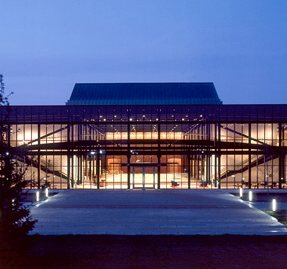|
Week of May 24, 2004 Blockbuster Deal from Site Selection's exclusive New Plant database |
|
LOOKING FOR A PREVIOUS STORY? CHECK THE ARCHIVE.
Fence Fuss Fixed at Last, Pixar Plans 1,300-Job California HQ Expansion
By JACK LYNE, Site Selection Executive Editor
EMERYVILLE, Calif. – "Good fences make good neighbors," Robert Frost once wrote.
It was a fence, though, that almost finished off Pixar Animation Studios' (www.pixar.com) plan to add 1,300 new jobs at its headquarters in Emeryville, Calif., 10 miles (16 kilometers) east of San Francisco. Pixar's expansion calls for a 20-year, US$325-million project that would add three new buildings with 544,000 sq. ft. (48,960 sq. m.) of new space, plus a six-story, 1,801-space parking garage.
In short, it's just the kind of mega-deal that most area business recruiters desperately long to land. And Emeryville will - now, at least - be home to Pixar's big-time expansion. But it almost wasn't. For a while, the massive project looked like it might simply evaporate, felled by a tiff that echoed some other lines from that famous Frost poem: "Something there is that doesn't love a wall/that wants it down." But if our wall comes down, Pixar said, we're leaving town. City Council Delayed
The project's near-death experience materialized at the Emeryville City Council's (www.ci.emeryville.ca.us) May 18th meeting. That session seemed to be winding down, having already extended well past midnight, with more than two hours' worth of public testimony. Apparently, the council was readying to approve Pixar's expansion design.
Approvals on Pixar Expansion Then, though, an unexpected issue flared up: the fence. That partition surrounds Pixar's 215,000-sq.-ft. (19,350-sq.-m.), 730-employee headquarters. Standing eight feet (2.4 meters) tall, the wrought-iron fence, along with the facility, was constructed in 1998, when Pixar relocated to Emeryville from Richmond, Calif. City Council member Richard Kassis mentioned that the wall was "off-putting" to residents. He pointed out a report that Planning Commissioner Jim Martin had submitted earlier that suggested substituting the new buildings' walls for the fence in Pixar's design. "It would be a benefit to the city," Martin wrote in his report, if the Pixar campus were "more integrated into the surrounding urban fabric."
"We all bought into that you guys need a fence," Kassis told Pixar Director of Facilities Tom Carlisle. "But for the life of me, I cannot understand why this item, a brick building, cannot serve as a secure fence. I find myself constantly in the position of defending the fence." Kassis' suggestion prompted an unpredicted outcome: The council voted 3-2 to postpone for a week further action on Pixar's project. Pixar Facilities Director: Without
The postponement immediately brought an emotional retort from Carlisle.
Fence, 'We Will Not Stay in Emeryville' "This [fence] is very important to [Pixar CEO] Steve Jobs," Carlisle told the City Council. "He has told me that twice today. My job is on the line here." The council, Carlisle pointed out, had approved a fenced headquarters campus when the company first came to Emeryville. And, he added, Pixar had already conceded that it would move back the fence around the new facilities by seven and a half feet (2.3 meters), five feet (1.5 meters) farther than in its original design. In addition, the company has agreed to add outside-the-wall features including a bike and pedestrian path, and a landscaped area with trees and benches. "We're giving you things you didn't have before," Carlisle asserted. He reiterated why Pixar feels that its fence is a necessity. "We are a movie studio, and this is what movie studios do," Carlisle explained to the council. "Now that we are a more successful company, people want to get into Pixar. We get fans and tourists; we call them 'looky-loos.' "But we also get people who want to steal our intellectual property, our ideas," he continued. "It's no laughing matter that the world is a much different place than in 1998." And then Carlisle delivered a bombshell. "This is really disheartening for Pixar," he said. "If the city takes away our fence, we will not stay in Emeryville." A Few Tears, Then Council's
5-0 Vote OKs Pixar's Fenced Design
Even then, though, the wailed-over wall was again discussed at length. Kassis, for example, publicly agonized over his vote. At one point, he wept, describing how he wished that Pixar's headquarters were more open and welcoming to the community. But that desire, Kassis added, was overruled by an even stronger one: having Pixar's headquarters remain in Emeryville. A pleased Carlisle praised the council's approval of Pixar's design. With fence issue finally settled, the group moved on with the project, OK'ing resolutions that included the sale of five city-owned acres (two hectares) for the expansion. The group also approved the new pedestrian/bicycle path, as well as the planned time frames for the project's three phases. Pixar 'Very Involved in Community,'
The council's tension-triggering delay marked a sharp reversal from its more supportive stance at earlier meetings - including even the May 18th meeting.
But 'Not Because Someone Is Telling Us' The group earlier voted 5-0 at that meeting to approve a consultant's report that recommended a Mitigated Negative Declaration for Pixar's expansion plan. That decision means that the company won't have to file a full project environmental impact report (EIR). Area activists had repeatedly urged requiring a full EIR to assess the expansion's impact on traffic and pollution. Emeryville City Manager John Flores called the council's vote "a step in the right direction for other businesses" that may want to expand locally. Other project input at the May 18th meeting, though, wasn't so supportive. Much of it came from the East Bay Alliance for a Sustainable Economy (EBASE at www.workingeastbay.org), which has as its mission "ending low-wage poverty and creating economic equity in the San Francisco East Bay region." EBASE had consistently urged the council to require Pixar to hire union workers, underwrite area job-training programs and contribute more to affordable housing. EBASE Co-Executive Chair Amaha Kassa followed the EIR vote by charging that the Emeryville City Council was "afraid to ask anything of businesses, and, as a result, businesses don't feel they have to be accountable to the community." Resident Marty Englander urged Pixar to hire locals for union-wage construction jobs. "I want to welcome Pixar, and I hope you will be a good neighbor, but we have to live here too," she said. "This is not a place that people can afford anymore." In addition, EBASE members again voiced opposition to using the land on which Pixar will expand. That acreage, the group contended, had earlier been scheduled for 120 new housing units, with 24 reserved for low- to moderate-income residents.
But Emeryville Director of Economic Development Pat O'Keeffe at an April meeting had pointed out that Pixar's expansion would create $3 million a year in new tax dollars, with $600,000 of that amount allocated for the development of affordable housing. In addition, Pixar will pay the city a $500,000 impact fee each time it begins one of the three scheduled expansion phases. And the fenced-in company is already a good corporate neighbor, other local residents pointed out at the May 18th meeting. Pixar's community involvement, they said, includes being the biggest donor to both the city's food bank and the Emery Education Foundation, which supports Emeryville's public schools. In addition, Pixar sends some of its employees to local schools on company time to work as mentors, they added. "Pixar is very involved in the community," Carlisle told the City Council. "We do it because we like doing it, not because someone is telling us." Pixar's Expansion to Extend through 2024
The neck-snapping flip-flop that finally gave Pixar's project the go-ahead was a singularly unusual twist in project annals. But perhaps it's one with an outcome that echoes another famous writer's observation: All's well that ends well.
As for Pixar, it now seems to be advancing into action mode. The company said that it plans to begin its first-phase expansion sometime in the next 18 months, possibly as soon as this summer. That phase will involve building a 150,000-sq.-ft. (13,500-sq.-m.) facility that will house 325 employees. The building will be finished by 2008 at the latest, the company said. Pixar's second-phase expansion is scheduled to start by 2013, finishing by 2016. Phase three is planned to begin by 2021, wrapping up by 2024. Pixar's aggressive expansion reflects its recent success. Founded in 1986 by Apple Computer creator Jobs, the company has animated a number of box-office smashes, including "Toy Story" (the first feature film to be fully computer-animated) and "Finding Nemo." Last year, Pixar's net income of $124.8 million marked a 38.7-percent annual increase. Pixar has been so successful, in fact, that it's ending its relationship with the Walt Disney Company (www.disney.com) in 2006. And for a while there, it looked as if Pixar might also be ending its association with its headquarters city. Now, though, it's staying. And so is its fence.
©2004 Conway Data, Inc. All rights reserved. Data is from many sources and is not warranted to be accurate or current.
| ||||||||||||||




